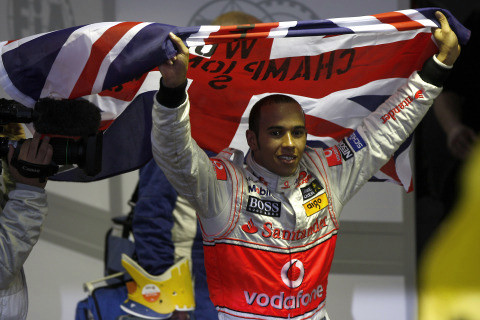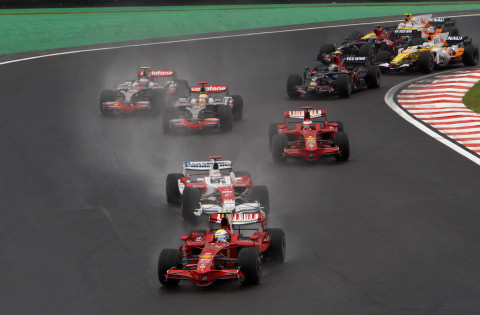The Way It Is/ Hamilton edges Massa for World Championship
by Gordon Kirby Nobody could have imagined the exciting final laps to this year's F1's season at Interlagos in Brazil on Sunday. Felipe Massa did everything he could to win the world championship as he dominated his home race to score his sixth win of the year. Rain in the closing laps kept everyone on their toes as everyone save Timo Glock and Jarno Trulli's pair of Toyotas came in for intermediate tires. But Massa handled the situation perfectly and as he took the checkered flag the little Brazilian believed he had also won the championship because Sebastien Vettel had passed Lewis Hamilton for fifth place with just three laps to go. But fourth-placed Glock was struggling on dry tires and near the end of the final lap both Vettel and Hamilton slipped by Glock so that Hamilton won the championship by a single point.
Nobody could have imagined the exciting final laps to this year's F1's season at Interlagos in Brazil on Sunday. Felipe Massa did everything he could to win the world championship as he dominated his home race to score his sixth win of the year. Rain in the closing laps kept everyone on their toes as everyone save Timo Glock and Jarno Trulli's pair of Toyotas came in for intermediate tires. But Massa handled the situation perfectly and as he took the checkered flag the little Brazilian believed he had also won the championship because Sebastien Vettel had passed Lewis Hamilton for fifth place with just three laps to go. But fourth-placed Glock was struggling on dry tires and near the end of the final lap both Vettel and Hamilton slipped by Glock so that Hamilton won the championship by a single point.
So despite F1's many faults and foibles the season ended on high note of pure racing. It may have been a perfect result as well with Hamilton winning the driver's title and Ferrari once again taking the constructor's championship. Ferrari is F1's leading brand by far and it's probably true that the red cars current, seemingly perennial role as world champion constructor is exactly what's needed to promote the sport in the mass market, on television and across the emerging Asian and Arabian markets where Bernie Ecclestone and Max Mosley have staked F1's future. Ferrari has won eight of its sixteen constructors titles over the past ten years, beaten only by Renault in 2005 and '06, while McLaren-Mercedes last won the championship back in 1998.
This year it was Ferrari vs McLaren again and without last year's Draconian penalty McLaren was able to challenge Ferrari all year. But both teams and their drivers made repeated mistakes. Hamilton looked unbeatable in many races but he messed up in Bahrain, Canada and Japan. Hamilton won five races including the season-opener in Australia, Monaco where he was supreme, Silverstone where he was equally dominant in the rain, and Hockenheim the next weekend. The young Brit then went winless for six races until scoring another peerless win in China.
Hamilton didn't endear himself to his rivals with a very aggressive run through the field on the opening lap in the rain at Monza but he's extremely quick, capable of driving a loose car and often makes superb catches. Aboard this year's traction control-free F1 cars Hamilton has been a pleasure to watch. He deserved to win the championship in his second year in F1 and establish himself ahead of Fernando Alonso as history's youngest world champion.

© LAT USA
Nevertheless, the little Brazilian suprised most everybody this year by outperforming Kimi Raikkonen and emerging as Ferrari's championship card. In some races Massa was peerless, in others he was barely a bit player, but he took the championship battle down to the last race on his home turf in Brazil and came within a whisker of becoming Brazil's first world champion since Ayrton Senna.
Defending champion Raikkonen ran hot and cold. He won in Malaysia and Spain early in the season, but proceeded to strike-out over the rest of the year. Despite leading some races the Finn was unable to win through the last fourteen races. Ostensibly, Raikkonen's driving style doesn't suit the latest Bridgestone tires in qualifying and it was true that he often came on strong in the last part of many races this year. But you have to wonder if Kimi's insouciant lifestyle is catching up with him. Is he sometimes not as sharp physically as he should be?
Raikkonen clearly is not in Michael Schumacher's league when it comes to providing feedback during testing or possessing the ability and motivation to push forward the team's test and development program. But Ferrari has re-signed Raikkonen for two more years, spurning the possibility of replacing him wirth Fernando Alonso.
Countryman Heikki Kovalainen has also been extended by McLaren-Mercedes. Kovalainen proved a quick and competent number two to Hamilton in '08. Very quick on occasion, he was able to score his first F1 victory in Hungary in mid-summer but there were some races in which Kovalainen provided little support for Hamilton. In the end, the constructors title again went to Ferrari, largely because Massa and Raikkonen proved a stronger pairing than Hamilton and Kovalainen.
There were three first-time winners in 2008--Kovalainen, Robert Kubica and Sebastien Vettel. Kubica won in Canada twelve months after his infamous big shunt in '07, scoring the first win for both he and BMW. The Czech mysteriously tailed off in the year's closing races and was beaten by Raikkonen to third in the driver's championship. Nick Heidfeld helped BMW enjoy a banner year as the team finished a strong third in the constructor's title race, only sixteen points behind McLaren.
Vettel impressively scored his and Toro Rosso's first win in the rain at Monza and became F1's youngest winner. The young German has demonstrated tremendous ability this year and finished eighth in the championship behind Heidfeld and Kovalainen. It will be interesting to see if Vettel can move closer to the front on a regular basis next year as he moves from the Ferrari-powered Toro Rosso team to Red Bull's own Renault-powered cars.
Sebastien Bourdais may not have been able to match Vettel, but he showed that he belongs in F1. If he doesn't continue with Toro Rosso, the Frenchman's test-driving abilities should make him a useful addition to any team.
Fernando Alonso won two races in a row for Renault in Singapore and Japan near season's end, profiting in both races from numerous errors by the championship contenders. Early in the year the Renault was well off the pace but hard work from the team and Alonso meant the cars were stronger in the season's latter stages. Alonso wound up finishing fifth in the driver's championship and Renault took fourth ahead of Toyota in constructor's points.

© LAT USA
Of course, the FIA has written a brace of new rules for '09, including a move back to slicks, a narrower rear wing, moving the diffuser further back behind the rear axle centerline and new rules designed to ban bargeboards, turning vanes, winglets and louvres. There's also a lower, wider, driver-adjustable front wing intended to make more passing possible. And of course, KERS (kinetic energy recovery systems) also arrive in F1 next year.
In the last month, Max Mosley has also proposed a spec engine and gearbox for 2010. Not suprisingly, Ferrari responded by declaring they will quit F1 if the spec engine happens and Toyota and BMW have essentially said the same. Most people believe the spec engine and gearbox proposal is typical Mosley game-playing as he tries to push through his 'cost-saving' agenda. After all, spec engines with KERS seems to be a contradiction in terms, to say the least.
It's fatuous for Mosley to profess he's such a big fan of cost-saving because, as we all know, rule changes are the biggest offenders in driving-up costs and he's certainly driven up the costs with his battery of rules for next year. Will Mosley depart the FIA as promised at the end of 2009? Many people will be happy to see it happen.
Meanwhile, the Canadian and French GPs have been expunged from the '09 schedule and many people expect the British and Belgian races to vanish over the next few years. More Asian and Arabian races are sure to replace these classics on the F1 calendar. It's all about money and making maximum profit for CVC, the financial firm that purchased F1 in 2006. In its November edition, Motor Sport magazine reported that CVC has a hefty thirst for profits in order to service the billion dollars in loans it obtained from RBS and the bankrupt Lehman Brothers to fund its purchase of F1.
Motor Sport reported that new races this year in Valencia and Singapore brought FOA (Formula One Administration) more than $70 million while Abu Dhabi is believed to have agreed to pay FOA more than $40 million for its inaugural race at the end of next year. Only four of the eighteen 2007 F1 races--the United States GP, Italy, Brazil and France--were without government funding. Motor Sport also reported that the economic impact on the local region for each F1 race in 2007 averaged $108 million.
For thirty years, Montreal's Canadian GP brought the biggest economic impact each year of many sports and cultural events in the city. Montreal's mayor and race promoter Normand Legault are doing all they can to convince Bernie Ecclestone to reconsider the cancellation of the Canadian GP. If their entreaties are spurned I expect they will then make a sales pitch to NASCAR to upgrade the Nationwide race at le Circuit Gilles Villeneuve to a Sprint Cup race. Without F1 a Cup race is the only solution for Montreal and if it happens it will be the first Cup race run outside the United States and will be a tremendous boon to NASCAR and a great loss for F1. But Bernie, Max and the people at CVC don't care.
Like I said in this space six weeks ago, we can only hope Chris Pook can pull off his attempt to revive F1 in America in 2010. If Pook can't create a race capable of generating a sanctioning fee four or five times larger than the Indy 500, Daytona 500 or Brickyard 400, nobody can, and F1 will be gone forever from North America.
And congratulations to 16-year old Conor Daly on his superb victory in Sunday's Walter Hayes Trophy Formula Ford spectacular at Silverstone. Team USA driver Daly finished second to teammate Josef Newgarden in one of the two semi-finals then scored a great win in the rain-sodden final after Newgarden slid off the road. Newgarden recovered to finish fourteenth. Daly and Newgarden have done a tremendous job on their visit to the UK, demonstrating that there may yet be an international future for American racers. Here's hoping Daly and Newgarden will be rewarded with the sponsorship to push their careers forward as they clearly deserve.
Auto Racing ~ Gordon Kirby
Copyright 2008 ~ All Rights Reserved
Copyright 2008 ~ All Rights Reserved
Top of Page